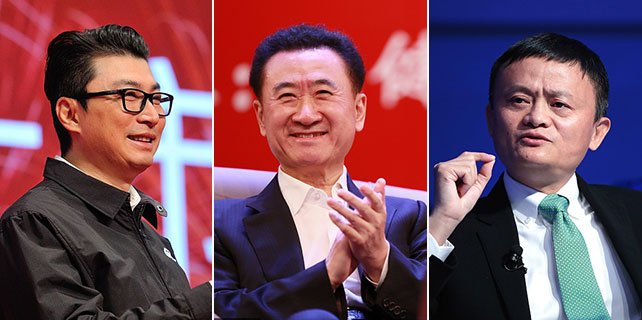News in review

Monday____May 22
LeEco CEO is replaced, remains chairman
The founder of Chinese tech conglomerate LeEco Jia Yueting will step down as chief executive of Leshi Internet Information & Technology Corp Beijing, according to a stock exchange filing.
Jia will remain as chairman, focusing on corporate governance, strategic planning and core product innovation. The board has approved Liang Jun to replace Jia as CEO.
Jia said at a news conference on Sunday that LeEco will be divided into two sections; the listed business and automobile. Other businesses will be combined into the listed business, NetEase Finance reported.
Founded in 2004, LeEco started as a Netflix-style video-streaming service provider, but it rapidly grew into a tech heavyweight with a presence in smartphones, TVs, sports, media and electric cars. (Photo 1)
AIIB expects to sign 85 members by year's end
The China-backed Asian Infrastructure Investment Bank expects to grow its membership to 85 by the end of this year, bank president JinLiqun said.
China won broad support for the establishment of AIIB, with 57 founding members, Jin said at the Jiangsu Development Summit in Nanjing, East China's Jiangsu province.
"By the end of this year, a total of 85 countries and regions will become AIIB's members," Jin said.
Reflecting on the process of setting up the new bank and securing support from founding members, he said China had shown its willingness to serve the world using the experience of reform and opening up.
"Though the Belt and Road Initiative doesn't cover all AIIB members, we will make more effort in the future and believe more and more countries will join the AIIB," Jin added.
Tuesday____May 23
Restrictions on foreign investments will be eased
China will ease restrictions on foreign investment, including a further opening-up in sectors such as services, manufacturing and mining, according to a news release issued after a key Party meeting.
A revised version of the Catalog for the Guidance of Foreign Investment Industries was approved at the Tuesday meeting of the Communist Party of China Central Committee's Central Leading Group for Deepening Overall Reform.
Xi Jinping, general secretary of the CPC Central Committee, presided over the meeting on Tuesday, the 35th of its kind.
The move was made as utilization of foreign capital in the first four months of 2017 reached $41.6 billion (286.4 billion yuan), a slight drop of 0.1 percent year-on-year, according to the Ministry of Commerce.
Extra sugar tariff to be put on imports
China will start to levy a safeguards tariff on sugar imports after a six-month investigation to protect the domestic sugar industry and stabilize the market.
Based on the results of the investigation and suggestions made by the ministry, the Tariff Commission of the State Council decided to collect an extra 45 percent tariff on top of the current 50 percent duty for out-of-quota sugar imports for this fiscal year. The anti-dumping duty will be reduced to 40 percent in the next year and 35 percent in the following year.
China is a large sugar-producing country with more than 14 million tons of annual output, involving around 40 million sugar farmers, especially in sugar-producing regions including the Guangxi Zhuang and Xinjiang Uygur autonomous regions.
China has ranked first in sugar imports globally for many years. (Photo 2)
Wednesday____May 24
Consumer confidence surges in Q1
China's consumer confidence index in the first quarter hit the highest score since 2015, buoyed by an improved macroeconomy and surging consumption power, Nielsen's latest survey showed.
The latest figure, which stood at 110, is up two points from the previous quarter, suggesting that along with the stable growth in individual incomes, Chinese consumer confidence is continuing to rise. It also points to the overall steady growth of China's economy.
China's consumption upgrade trend has fueled people's spending intentions, said Vishal Bali, managing director of Nielsen China.
Nielsen's China consumer confidence index measures perceptions of local job prospects, personal finance and immediate spending intentions. Consumer confidence levels above and below a baseline of 100 indicate degrees of optimism and pessimism, respectively. (Photo 3)
Bike sharing faces regulations
China released a draft guideline to regulate the booming public bike-sharing industry, which has surpassed 100 million registrations by users, according to the Ministry of Transport.
The draft aims to solve problems like illegal parking, lack of clarity in company responsibilities and the safety of users' deposits and personal information.
Public opinion is being solicited until June 5 on the draft, released by the Ministry of Transport and other agencies.
The draft says companies will be required to buy insurance for users, and they are encouraged to waive deposits for users to rent the bikes. Companies should establish ways to handle complaints, comments and suggestions from the public. Companies are encouraged to use high technology to regulate parking of their bikes. (Photo 4)
Thursday____May 25
Smoking scenes reduced in films, TV series
Smoking scenes have been significantly reduced in Chinese films and reduced in TV series in the past decade thanks to increasing awareness by the industry and the public, according to a survey by the Chinese Association on Tobacco Control.
Seventeen of 30 movies surveyed had smoking scenes, down nearly 35 percent from 2007, according to the association.
The decline in the number of smoking scenes in TV series was even more evident. Half the top 30 most-watched Chinese TV series had smoking scenes, a 45 percent drop from 2007. The average length of the smoking scenes dropped by 90 percent between 2007 and 2016.
Under regulations issued in 2009 and 2011 by the State Administration of Press, Publications, Radio, Film and Television, smoking scenes are "strictly controlled" rather than banned.
China Life pays $950m for 48 properties in US
Chinese leading insurer China Life Insurance (Group) Co is buying 48 commercial properties in the United States with total value of $950 million.
China Life Investment Holding Co Ltd, an alternative investment and management company and unit of China Life, is buying a 95 percent stake in the real estate projects from ElmTree Funds LLC, a private-equity firm based in St Louis. China Life said ElmTree would retain a 5 percent stake and continue to manage the properties together.
The 48 customized commercial properties are in 21 states and include logistics centers, office buildings and healthcare facilities. Tenants include General Electric, Federal Express, Caterpillar and T-Mobile.
In 2015, China Life made its first US deal, joining Ping An Insurance to buy a majority stake in a Boston development in the city's Seaport District.
Friday____May 26
Imports from US to be expanded
More US imports China will increase imports from the United States in wide-ranging areas, including agricultural products, energy and high-tech equipment, the Ministry of Commerce (MOC) said.
In a research report on China-US Economic and Trade Relations, the MOC noted the growth potential in US exports as China's total imports are expected to reach $8 trillion in the coming five years, which will bring more opportunities for US companies.
China would like to further increase imports of agricultural products such as soybeans and cotton from the US and speed up negotiations on terms regarding traceability, inspection and quarantine for US beef to enter China, which will benefit 6 million American farmers, according to the report.
China is also willing to have active discussions on imports of more aircraft, microchips, machine tools and other high-tech products, the report said.
Shared bikes banned in Beijing military areas
Shared bikes are banned from military areas in Beijing, a military officer said.
Off-limits zones include restricted military areas and hospitals, residential areas, and sanitariums administrated by the military in Beijing.
"Bike sharing has brought new problems to the management of military areas, such as illegal parking and entering and exiting without approval," said the officer with the training management department of the Central Military Commission.
Bike-sharing services have surged in Chinese cities in the past two years. They allow riders to hire bikes for about 15 cents (1 yuan) per hour via a mobile app and drop them off for the next user.
|
Minnie Mouse and other Disney characters entertain visitors at Shanghai Disney Resort, which will welcome its 10 millionth visitor on its first anniversary on June 16. Yin Liqin / For China Daily |
(China Daily USA 05/26/2017 page12)

















